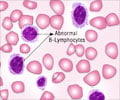Phase II trial of the novel combination, decitabine, venetoclax, and ponatinib achieved bone marrow remission in 80% of patients with advanced Leukemia.

Acute myeloid leukemia (AML) is an aggressive type of cancer that starts in the blood and blood-forming tissues of the body. It primarily impacts people over the age of 65.
Go to source).
‘Combining decitabine, venetoclax, and ponatinib helped 80% of patients with advanced CML and AML reach bone marrow remission. #leukemia #bonemarrow #treatment #medindia’





The study highlights the need for additional research for effective treatments, as there are very few studies that have developed a regimen to treat this rare disease.Principal investigator Nicholas Short, M.D., emphasized the importance of achieving bone marrow remission to enable patients to be considered for stem cell transplants.
Treatment Outcomes for Advanced Leukemia (CML and AML)
A total of 20 patients were enrolled in the trial, with 14 having myeloid blast-phase CML, 4 with accelerated-phase CML, and 2 with Philadelphia chromosome-positive AML.Overall, 50% of patients achieved complete remission or complete remission with an incomplete hematological recovery. An additional 30% of patients achieved a morphologic leukemia-free state. Responses were seen even in patients who had received multiple prior therapies and in those with high-risk cytogenetic or molecular features.
“For this trial, we were able to build on previous preclinical and clinical research conducted at MD Anderson, which identified synergy between the BCL-2 inhibitor venetoclax, and the BCR::ABL1 tyrosine kinase inhibitor, ponatinib,” Short said. “This knowledge led us to consider this novel treatment regimen for this aggressive disease.”
Advertisement
Side Effects of Novel CML and AML Treatment
The researchers observed expected side effects, which were consistent with previous studies involving these drugs. Common side effects included neutropenia, rash, and nausea.The trial is ongoing and enrolling additional patients. MD Anderson researchers also are conducting additional studies building on the approach of adding targeted therapies into new combinations for patients with advanced-phase CML.
Advertisement
- Acute myeloid leukemia (AML) is an aggressive type of cancer that starts in the blood and blood-forming tissues of the body. It primarily impacts people over the age of 65. - (https:www.mdanderson.org/cancer-types/acute-myeloid-leukemia.html)
Source-Eurekalert












